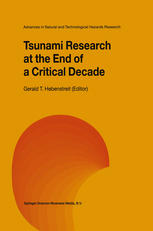

Most ebook files are in PDF format, so you can easily read them using various software such as Foxit Reader or directly on the Google Chrome browser.
Some ebook files are released by publishers in other formats such as .awz, .mobi, .epub, .fb2, etc. You may need to install specific software to read these formats on mobile/PC, such as Calibre.
Please read the tutorial at this link: https://ebookbell.com/faq
We offer FREE conversion to the popular formats you request; however, this may take some time. Therefore, right after payment, please email us, and we will try to provide the service as quickly as possible.
For some exceptional file formats or broken links (if any), please refrain from opening any disputes. Instead, email us first, and we will try to assist within a maximum of 6 hours.
EbookBell Team

4.3
18 reviewsThis volume, derived from the 1999 International Tsunami Symposium, presents a unique look at the state of tsunami research at the end of the 20th century. It displays recent progress both in data recovery and reconstructions of historical tsunamis and in detail examination of recent disasters. It shows the tsunami community using both traditional methods of data gathering - searching archives and attempting to simulate past events - and integrating modern technologies - side-scan sonar, GPS, global communications, supercomputers - in the quest to understand tsunamis and improve mankind's ability to mitigate the disastrous consequences of these unpredictable and unstoppable events. It chronicles recent advances in mitigation efforts while illuminating the continuing need for increased efforts. The papers range from descriptive texts for the non-specialists to fairly technical discussions for those familiar with tsunami research.
Audience: This book will be of interest to researchers and graduate students involved in natural hazards research, physical oceanography, seismology, environmental impact assessment and risk assessment.